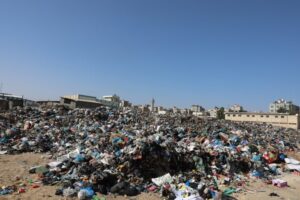Waste is piling up in Gaza. The public health implications are disastrous.

Destroyed garbage truck in Gaza City
Ahmed Abu Abdu reports in Mondoweiss on 25 September 2024:
As Head of Health and Environment Management at the Gaza City municipality, I am responsible for processing and disposing of all types of waste, including household, medical, industrial, agricultural, and marine waste. With a population exceeding 800,000 people, our city generates over 700 tons of waste daily. Before the Israeli genocide began on October 7 almost a year ago, managing this volume of waste in a city under siege was already challenging. The Israeli occupation systematically prevented us from importing or building the necessary equipment to carry out our work, including garbage trucks or waste treatment facilities, over nearly two decades. After the genocide began, the Israeli occupation launched a war on all our sanitation facilities and waste management systems, with the objective of creating an environmental and health crisis in Gaza.
Over the years, I have lived through several Israeli assaults on Gaza — in 2008, 2012, 2014, and 2021. Each time, we adapted and continued our essential services. But this war is unlike anything we have ever seen. It is not just another assault, but a genocide aiming to take away our city’s ability to function. Every day feels like a Sisyphean race against time to maintain essential services for a city being systematically obliterated.
The occupation targeted our teams in East Gaza where our landfill is located, making it impossible to transport waste there and forcing us to pile it in the middle of the city, creating hazardous conditions for Gaza residents.
From the very beginning of the war, I constantly worried about my family’s safety. When the Israeli army ordered evacuations, I took my family to Khan Younis in the south as instructed. The image of my mother’s tearful plea for me to stay with them when I decided to go back north will forever haunt me. Yet, I felt compelled to return to Gaza City to continue my work for those still there.

Makeshift landfill in Gaza City
Driving back alone, I passed a vehicle hit by an airstrike. I saw bodies scattered across the road, and rubble was everywhere. I pressed on despite my fear.
Upon my return to Gaza, I was alone. We struggled to salvage what remained of the waste management system and to keep basic services operational for those who remained. Amid the dire conditions, I lost over 8 kilograms within a month. My mother almost didn’t recognize me when we spoke together on a video call.
Managing solid waste during a genocide
Before the genocide, the blockade had already prevented us from importing proper equipment like compactors or incinerators. Our entire system was already fragile as a result of the 17-year-long siege.
